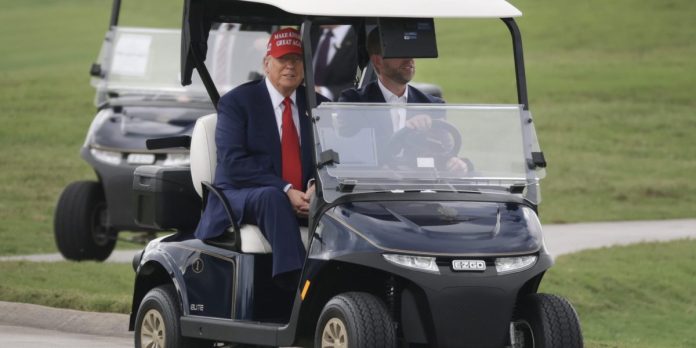- Corporate executives who gathered at last month’s Yale CEO Caucus were surveyed on when they should collectively voice their concerns about President Donald Trump, and most said it would take a 20% drop in the stock market. The Nasdaq and Russell 2000 have already entered bear market territory, while the S&P 500 is getting closer.
CEOs have largely avoided public criticism of President Donald Trump as he rolled out his tariffs, but the recent stock market carnage may trigger a change.
Dozens of top corporate executives who gathered at last month’s Yale CEO Caucus were surveyed in an impromptu poll on when the stock market should cause them to collectively voice their concerns about Trump.
According to the Wall Street Journal, 44% of CEOs said a 20% drop, 22% said a 30% decline, 10% said a 50% crash, and 24% said it’s not their role.
The question didn’t specify the starting point for measuring the market loss. By some measures, stocks have crossed or are near the 20% threshold.
The Nasdaq and Russell 2000 have tumbled more than 20% from their 52-week highs, entering bear market territory. The S&P 500 is down 17%, and the Dow Jones Industrial Average is off 15%.
The losses are less steep, however, if you start from Trump’s inauguration or when the poll was conducted in mid-March. Still, the two-day stock rout after “Liberation Day” wiped out $6 trillion in market cap and marked the worst meltdown since the early days of the COVID-19 pandemic in 2020.
To be sure, some executives have reportedly voiced concerns about tariffs behind closed doors in earlier meetings with the president and his staff. But in public, they have remained reticent to avoid angering Trump.
Yale School of Management professor Jeffrey Sonnenfeld, who organized the March summit, told the Journal on Saturday that top CEOs have expressed frustration to him, but think trade groups should more forcefully oppose the tariffs or make collective statements.
“They don’t want to be the lightning rod,” he said. “Then it becomes personalized to them.”
Similarly, an unnamed board member of a US company told the Financial Times on Friday, “You don’t want to be the barking dog for everyone else because you’re going to be the one who will get shot.”
Another corporate board member told the FT the best approach is to lobby Trump and his advisers privately and say that tariffs would hit his core constituents with higher prices and unemployment.
For its part, the Business Roundtable said in a statement on Wednesday that it supports Trump’s goal of securing fairer trade deals but warned “universal tariffs ranging from 10-50% run the risk of causing major harm to American manufacturers, workers, families and exporters.”
But there may be signs of more opposition from Corporate America.
Trump adviser Elon Musk appeared to break with the White House’s trade war on Saturday, when the Tesla CEO expressed hope for a “zero-tariff” system between the US and Europe that would create “a free-trade zone.”
And earlier on Saturday, Musk belittled White House official Peter Navarro, who was reportedly a key figure on the tariff policy, suggesting on X that his Harvard degree is “a bad thing” and that he has never built anything.
Meanwhile, tech journalist Kara Swisher posted on Threads on Friday that “a passel of high profile tech and also finance leaders is making a trip to Mar-a-Lago to read Trump the riot act — um talk common sense — to him on the tariffs.”
She added that Musk was also in their crosshairs for “his ‘idiotic chainsaw’ antics and more,” alluding to the drastic cuts to federal agencies this his Department of Government Efficiency is spearheading.
The White House and Tesla didn’t immediately respond to requests for comment.
On Sunday, Treasury Secretary Scott Bessent gave no indication that Trump will back off from this aggressive tariffs and said there doesn’t have to be a recession, despite Wall Street pricing in greater odds of a downturn this year.
In an interview with NBC’s Meet the Press, he also downplayed the massive stock selloff as a short-term reaction.
This story was originally featured on Fortune.com




